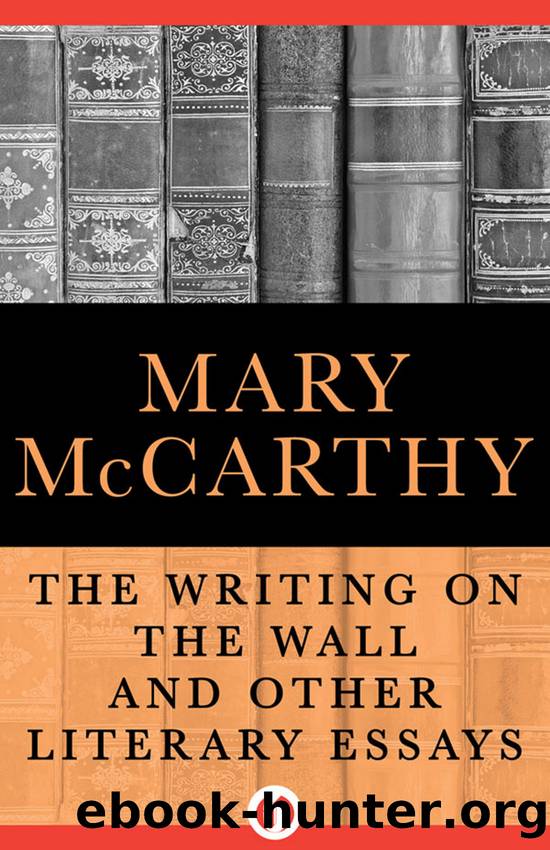Writing on the Wall and Other Literary Essays by Mary McCarthy

Author:Mary McCarthy [McCarthy, Mary]
Language: eng
Format: epub
ISBN: 978-1-4804-4122-4
Publisher: Open Road Media
Published: 2013-09-11T19:46:00+00:00
The Inventions of I. Compton-Burnett
A COMPTON-BURNETT IS A reliable make, as typical of British Isles workmanship as a tweed or Tiptree or ah Agatha Christie. The styling does not change greatly from year to year; production is steady. The specifications for the current model (A God and His Gifts, 1963) are much the same as those for the original patent (Pastors and Masters, 1925). An earlier patent (Dolores, 1911) was allowed to lapse. The setting is standard: a large country house, capable of being converted into a school—with visiting days for parents. There are a great many stairs (hard on the help) and passages, suitable for eavesdropping. At the sound of a gong old and young, brothers and sisters, men and wives, masters and servants muster in the dining-room. Other points of assembly are the nursery, the kitchen, and the common room. The period is late Victorian; the subject is human nature, cut from the old block, ribbed in the Adam pattern of murder and incest. Felix Culpa, an androgyne bookworm, is in the schoolroom, curled up with a popular novel, the Book of Job. His sister, Maxima Culpa, is in the library; a sulphurous smell of will-burning proceeds from the grate.
Detection seems to be natural to the English novel; this is true even in Jane Austen, where a Wickham or a Frank Churchill is “found out.” The traditional English novel, from Fielding on, deals in lost-and-found identities, concealment and discovery. Unlike the Continental novel (or the American), it is a kind of commodity with a warranty of unfailing reader-interest contained in the plot, which works like a factory mechanism—the mills of the gods. One of the mischievous originalities of Compton-Burnett is to have pursued this insular tendency to the extreme, making it her trademark. She produces Compton-Burnetts, as someone might produce ball bearings. (Dickens produced Dickenses, but Flaubert did not produce Flauberts.) Hence the uniformity of labeling in her titles and the open-stock patterns of her incidents and dialogue. The author, like all reliable old firms, is stressing the sameness of the formula: senior service. Her books have a magic ingredient—forgettability, which makes them just as good the second time. She has no imitators. The formula is a trade secret. When she consents to give interviews about her work, Compton-Burnett is cryptic, like an oracle or a hermit inventor.
This habit of secrecy (possibly an effect of the genteel tradition, which frowned on trade and manufacture and still more on their inner workings, felt to be unmentionable, like undergarments) has given rise, naturally, to legends about her life and her novels—legends which, in the case of her life, borrow from the plots of her novels, though she herself has complained that life does not have plots. As for her novels, criticism quite commonly turns them into a sort of hearsay or third-hand report, and you can read in the New York Times Book Review—or the French review Critique—that Compton-Burnett “refrains from”—“often omits”—physical description of her characters, when in fact one
Download
This site does not store any files on its server. We only index and link to content provided by other sites. Please contact the content providers to delete copyright contents if any and email us, we'll remove relevant links or contents immediately.
The Power of Myth by Joseph Campbell & Bill Moyers(1065)
Half Moon Bay by Jonathan Kellerman & Jesse Kellerman(986)
A Social History of the Media by Peter Burke & Peter Burke(985)
Inseparable by Emma Donoghue(982)
The Nets of Modernism: Henry James, Virginia Woolf, James Joyce, and Sigmund Freud by Maud Ellmann(911)
The Spike by Mark Humphries;(811)
The Complete Correspondence 1928-1940 by Theodor W. Adorno & Walter Benjamin(787)
A Theory of Narrative Drawing by Simon Grennan(778)
Culture by Terry Eagleton(774)
Ideology by Eagleton Terry;(741)
World Philology by(718)
Farnsworth's Classical English Rhetoric by Ward Farnsworth(714)
Game of Thrones and Philosophy by William Irwin(712)
Bodies from the Library 3 by Tony Medawar(708)
High Albania by M. Edith Durham(703)
Adam Smith by Jonathan Conlin(693)
A Reader’s Companion to J. D. Salinger’s The Catcher in the Rye by Peter Beidler(688)
Comic Genius: Portraits of Funny People by(651)
Monkey King by Wu Cheng'en(651)
